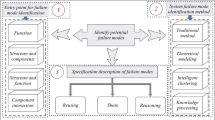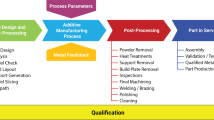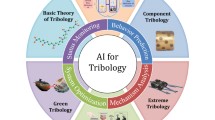Abstract
The traditional decision-making process during early design stages deals with deterministically evaluating the design candidates in accordance with concrete objectives by assuming optimal or nominal design performance values for the candidates. However, this may increase subjectivity in the decision process since the design knowledge during early design is usually imprecise and incomplete, and mostly needs to be iteratively updated throughout product design development. To diminish the subjectivity, the knowledge of the design requirements can be precisely and accurately represented by means of probabilistic constraints that describe the uncertainties in the design requirements; therefore, in this work, a systematic design framework supported by reliability analysis is developed in such a way that it is able to provide an effective connection among the early design steps especially both at system level and component level. Thus, the probability of failures of the design candidates and their sub-solutions are investigated, based on design constraints with Gaussian distributions, or lower and upper bounds, by utilizing Monte Carlo method. To illustrate the potential applicability and efficacy of the proposed framework, a two-finger gripper design problem is considered. The results clearly demonstrate that the proposed framework is effective to achieve reliable design solutions that have uncertain quantitative characteristics to be used further in probabilistic structural analysis during the next design stages such as embodiment and detail design stages.








Similar content being viewed by others
Abbreviations
- C(·):
-
Capacity function
- D(·):
-
Demand function
- DP:
-
Design parameter
- FCC(θ):
-
Uncertain function-level capacity constraint
- FDC :
-
Deterministic function-level demand constraint
- FDC(θ):
-
Uncertain function-level demand constraint
- g(·):
-
Limit-state function
- OWV :
-
Overall weighted value
- P(·):
-
Probability
- P f :
-
Probability of failure
- R :
-
Reliability
- R P :
-
Reliability of a parallel system
- R S :
-
Reliability of a series system
- SF:
-
Sub-function
- SRQ:
-
System-level requirements
- SS:
-
Sub-solution
- SV:
-
Solution variant
- TCC :
-
Deterministic top-level capacity constraints
- TCC(θ):
-
Uncertain top-level capacity constraint
- TDC :
-
Deterministic top-level demand constraint
- W DP :
-
Relative importance weight of a design parameter
- WRss :
-
Weighted reliability of a sub-solution
- WRsv :
-
Weighted reliability of a solution variant
- Xi min :
-
Minimum requirement value for ith sub-function
- Xi max :
-
Maximum requirement value for ith sub-function
- Xs min :
-
Minimum system requirement value
- Xs max :
-
Maximum system requirement value
- µ i :
-
Mean value of a system requirement for ith sub-function
- σ i :
-
Standard deviation value of a system requirement for ith sub-function
- µ s :
-
Mean value of a system requirement
- σ s :
-
Standard deviation value of a system requirement
References
Avontuur GC, Van Der Werff K (2001) An implementation of reliability analysis in the conceptual design phase of drive trains. Reliab Eng Syst Safety 73(2):155–165
Bai Z, Li X, Tan R, Lian B (2008) A function failure analysis method for improving reliability of the product based on GO-FLOW methodology. Industrial engineering and engineering management, 2008. IEEE international conference, pp 550, 555, 8–11 Dec
Choi S-K, Grandhi R, Canfield RA (2007) Reliability-based structural design. Springer, Berlin
Chong Y, Chen CH, Leong K (2009) A heuristic-based approach to conceptual design. Res Eng Design 20(2):97–116
Cooper G, Thompson G (2002) Concept design and reliability. Acta Polytechnica 42(2):3–12
Cross N (1984) Developments in design methodology. Wiley, Chichester
Fernandes J, Henriques E, Silva A, Moss MA (2014) Requirements change in complex technical systems: an empirical study of root causes. Res Eng Design 26(1):35–37
Guo X-H, Jiao Z-X, Wang S-P (2009) Reliability-integrated conceptual design for hydraulic system. Advanced intelligent mechatronics, AIM 2009. IEEE/ASME international conference on, 1065–1069
Huang H-Z, Liu Y, Li Y, Xue L, Wang Z (2013) New evaluation methods for conceptual design selection using computational intelligence techniques. J Mech Sci Technol 27(3):733–746
Huang Z, Jin Y (2009) Extension of stress and strength interference theory for conceptual design-for-reliability. J Mech Des 131(071001):1–11
Hubka V (1974) Theorie der Maschinensysteme. Springer, Berlin/Heidelberg, pp 6–117
Hyeong-Uk P, Joon C, Jaewoo L, Kamran B, Daniel N (2011) Reliability and possibility based multidisciplinary design optimization for aircraft conceptual design. 11th AIAA aviation technology, integration, and operations (ATIO) conference. American Institute of Aeronautics and Astronautics
Kurtoglu T, Tumer IY (2008) A graph based fault identification and propagation framework for functional design of complex system. ASME J Mech Des 130(5):051401
Li F, Wu T, Hu M, Dong J (2010) An accurate penalty-based approach for reliability-based design optimization. Res Eng Design 21(2):87–98
Li W, Li Y, Wang J, Liu X (2010) The process model to aid innovation of products conceptual design. Expert Syst Appl 37(5):3574–3587
Liu Y, Huang H-Z, Ling D (2013) Reliability prediction for evolutionary product in the conceptual design phase using neural network-based fuzzy synthetic assessment. Int J Syst Sci 44(3):545–555
Lough KG, Stone RB, Tumer IY (2006) Prescribing and Implementing the Risk in Early Design (RED) Method. Proceedings of the IDETCC/CIE, Philadelphia, PA, Paper No. DETCC2006-99374
Lough KG, Stone R, Tumer IY (2009) The risk in early design method. J Eng Des 20(2):155–173
Mayda M, Börklü HR (2014) An integration of TRIZ and the systematic approach of Pahl and Beitz for innovative conceptual design process. J Brazil Soc Mech Sci Eng 36(4):859–870
Mayda M, Börklü HR (2014) Development of an innovative conceptual design process by using Pahl and Beitz’s systematic design, TRIZ and QFD. J Adv Mech Design Syst Manufact 8(3):1–12
Neufeld D, Chung J, Behdinan K (2009) Aircraft conceptual design optimization with uncertain contributing analyses. AIAA modeling and simulation technologies conference. American Institute of Aeronautics and Astronautics, Chicago
O’halloran BM, Hoyle C, Stone RB, Tumer IY (2012) The early design reliability prediction method. ASME 2012 International mechanical engineering congress and exposition. Houston, Texas, USA: ASME
Ormon SW, Cassady CR, Greenwood AG (2002) Reliability prediction models to support conceptual design. Reliability, IEEE Trans 51(2):151–157
Pahl G, Beitz W (1977) Konstruktionslehre, 1st edn. Springer-Verlag, Berlin/Heidelberg, pp 15–250
Pahl G, Beitz W, Feldhusen J, Grote KH (2007) Engineering design-a systematic approach. Springer, Berlin
Sarno E, Kumar V, Li W (2005) A hybrid methodology for enhancing reliability of large systems in conceptual design and its application to the design of a multiphase flow station. Res Eng Design 16(1–2):27–41
Sriramdas V, Chaturvedi SK, Gargama H (2014) Fuzzy arithmetic based reliability allocation approach during early design and development. Expert Syst Appl 41(7):3444–3449
Sun X (2014) Incorporating multicriteria decision analysis techniques in aircraft conceptual design process. J Aircraft 51(3):861–869
Tan R, Ma J, Liu F, Wei Z (2009) UXDs-driven conceptual design process model for contradiction solving using CAIs. Comput Ind 60(8):584–591
Tsai Y-T, Lin K-H, Hsu Y-Y (2013) Reliability design optimisation for practical applications based on modelling processes. J Eng Des 24(12):849–863
Ullman DG (2002) The mechanical design process. McGrawHill, New York
Vinogradov O (1991) Mechanical reliability. Hemisphere, New York
Weber C, Birkhofer H (2007) Today’s requirements on engineering design science. Proceedings of the international conference on engineering design (ICED 07), Paris
Acknowledgements
This research was supported by the Scientific and Technological Research Council of Turkey (TUBITAK), under the BIDEP 2219-International Postdoctoral Research Fellowship Programme.
Author information
Authors and Affiliations
Corresponding author
Additional information
Technical Editor: Fernando Antonio Forcellini.
Rights and permissions
About this article
Cite this article
Mayda, M., Choi, SK. A reliability-based design framework for early stages of design process. J Braz. Soc. Mech. Sci. Eng. 39, 2105–2120 (2017). https://doi.org/10.1007/s40430-017-0731-y
Received:
Accepted:
Published:
Issue Date:
DOI: https://doi.org/10.1007/s40430-017-0731-y




